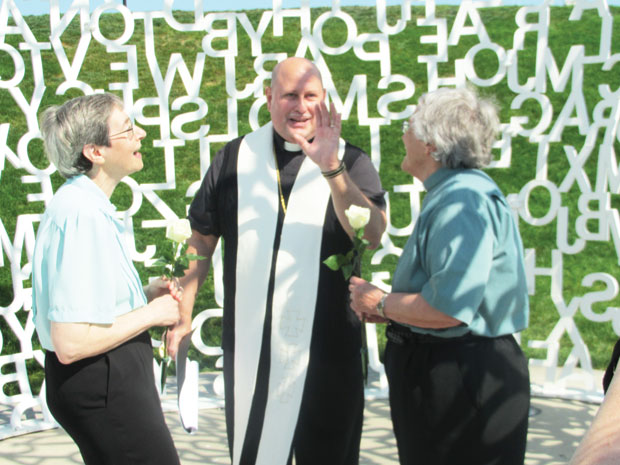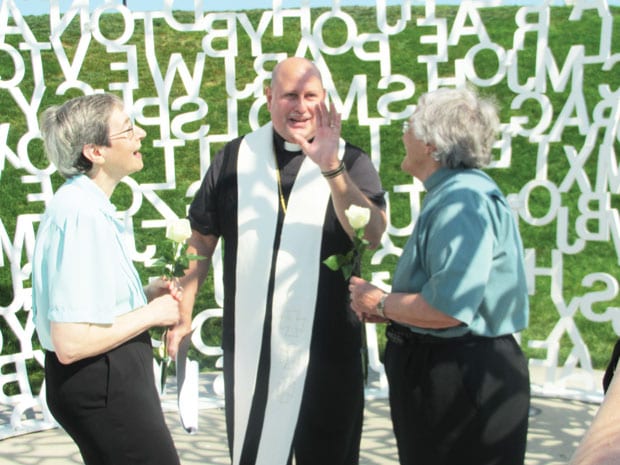From welcoming the LGBT community to performing weddings, Ascension Lutheran Church has been an ally for 50 years

FINALLY OFFICIAL | The Rev. Kurt Friederich of Ascension Lutheran Church marries longtime couple Arlene Robbins, left, and Lynn Guerra in an Iowa park last summer.
GARLAND — When Arlene Robbins and Lynn Guerra wanted their pastor at Ascension Lutheran Church to marry them last summer, he jumped at the chance.
The Rev. Kurt Friederich flew with them to Des Moines, Iowa, to perform a weekend ceremony, and the church surprised them with a party after services that Sunday.
“Everybody showed up from the church,” Robbins said about the reception.
The ceremony was for formality, because Robbins and Guerra, together almost 30 years, had a commitment ceremony back in the 80s after three years together.
“All I wanted was the legal piece of paper,” Robbins said, adding that as a Christian she always wanted the relationship to be legal. “I never liked living in sin. I think marriage is a great institution, and I want to be able to say, ‘This is my spouse.’”
The couple chose a simple scenic area in an Iowa park for the ceremony surrounded by a few family members. Afterward, they turned around to find the few dozen people in the park gathered, and they clapped for them at the end.
“We turned around, and all the people in the park were watching, even the people cutting the lawn,” Guerra said. “Everybody had stopped to watch us. It was just amazing.”
So has anything changed now that their union is legal?
“No,” they both answer, but their eyes meet as if there’s a secret between the two that only they know. And it’s clear that their love has only grown stronger over the three decades they’ve been together when they share their love story.
Robbins met Guerra, a retired Metropolitan Community Church minister, when she was stationed in Colorado Springs with the Army. Robbins joined a friend in Denver for a church service where Guerra also was in attendance. The two later went out to dinner before Guerra headed to Charlotte, N.C., to take over a church.
They reconnected a few years later through a friend, but they almost didn’t end up together. Robbins asked her friend to inquire how tall Guerra was “because I was tired of dating short women,” she joked.
Guerra was too short for her standards, but Robbins said she overlooked it.
“I really liked her,” she said, glancing at Guerra.
They started sending letters to each other, and Robbins later left the Army and moved to North Carolina.
Family brought them to Texas several years ago, and they’ve been members at Ascension Lutheran Church for five years.
Robbins and Guerra are one of about four LGBT couples at the church, which has a long history of LGBT inclusivity and outreach.
The church was a reconciled congregation long before the Evangelical Lutheran Church in America became open and affirming of the LGBT community. The ELCA has passed several resolutions to welcome gay and lesbian people since 1991, but the level of openness and affirmation varies by congregation, according to the ELCA’s website.
Friederich said the church was one of the first Lutheran churches to welcome the LGBT community in North Texas, if not the first.
“We led the way,” he said. “We’ve always taken the lead in the Lutheran Church in this area on LGBT issues.”
Friederich came on as pastor in 1999 and is only the second to lead the church, which will celebrate 50 years as a congregation in August.
He moved from Ohio to accept the job. His requirement that the church be welcoming of LGBT people made him sure the selection committee for the Texas church would rule him out. To his surprise, a pastor who supported LGBT issues was on the church’s list of requirements for a new pastor as well.
He took the congregation through a journey of identity as the new pastor and ended up embracing the concept of CULAC: compassion, understanding, love and care.
“That’s what we receive from God. I think that’s what God orders us to go out and do for the world,” Friederich said.
During his 16 years with the church, he’s had to face attacks for pushing for LGBT inclusion. Years ago he was yelled at during a Lutheran conference and told gays and lesbian were going to hell.
“It hasn’t been easy,” he said, adding that the anti-gay rhetoric died down when the bishop refused to condemn the community.
His love of LGBT people in the church goes back decades. He lobbied his old church in Cleveland Heights in the ’80s to allow him to perform a commitment ceremony for a gay couple. They’d met all of the church’s requirements to be married, and the ceremony took place. But not without some pushback.
“It caused consternation, and we lost some members,” he said, adding that it was the right thing to do to celebrate the couples love and devotion.
Even at Ascension, there’s been some pushback for being so inclusive with an equally divided congregation of Republicans and Democrats.
Years ago when the church discussed performing same-sex ceremonies, Friederich had a few meetings for members to express all of their opinions. No one came out against the move, but when the change was agreed upon, three couples left.
And when a couple approached him about their child being transgender, he said there would never be an issue for people to attend church as the gender they identify as.
“This is a congregation that looks at LGBT issues and sees there is no issue,” Friederich said. “There isn’t even a discussion.”
For Robbins and Guerra, they feel the love of the church’s members.
“They genuinely love us,” Robbins said.
This article appeared in the Dallas Voice print edition March 21, 2014.

